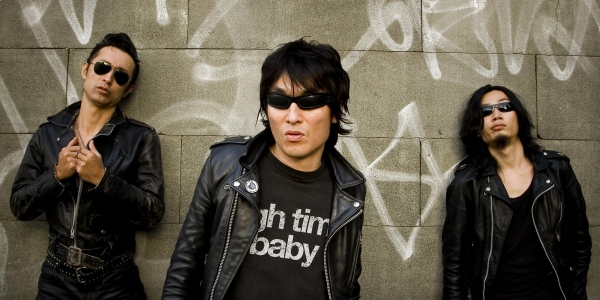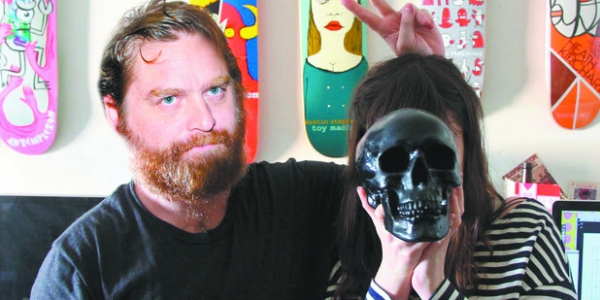Seiji isn’t sure exactly when he first heard rock ‘n’ roll, but he does remember the effect it had on him. “I don’t remember what the first rock ‘n’ roll song I heard was,” Seiji says. “What I remember is I was excited to hear the theme song of Ultra Man and Kamen Rider when I was a kid. It was the same excitement I get as I listen to rock. That excitement must be my first R&R experience,” he says.
On a musical front, Seiji had already started messing around with guitar. His efforts were inconclusive until he heard the rumbling sounds of legendary rock ‘n’ roll guitarist, the late Link Wray. “I had quit playing the guitar many times,” Seiji recalls. “Then one day I bought a record of Link Wray just because I liked the jacket. When I put the vinyl on the player, the song that determined my guitar style started. It was Rumble“. I thought even an elementary kid could play that simple guitar. But it was super cool. That experience stopped me to quit playing the guitar ever,” he says. At age 20 Seiji took to the stage for his first live performance. “I was about 20 years old when I first played, but I wasn’t playing the guitar yet. I was a vocal in a band. It was The Rolling Stones’ Jumping Jack Flash“.
His interest piqued in both rock ‘n’ roll and motorcycles, Seiji formed Guitar Wolf in the late ’80s. Taking as its core the friendship between Seiji (who took on the rock ‘n’ roll nom de plume Guitar Wolf) and Billy (aka Bass Wolf), the band recruited Toru (Drum Wolf) on drums, and released its first record Wolf Rock! in Japan in the early ’90s. Guitar Wolf undertook a tour of the United States, playing the Gonerfest punk rock music festival in Memphis. Eric Friedl, founding member of The Oblivians, was so impressed with Guitar Wolf that he established Goner Records and released Wolf Rock! in the United States. Twenty years later, and Seiji is still grateful for Friedl’s efforts in bringing Guitar Wolf to the world. “Without meeting him, we couldn’t have been here today,” Seiji says.
Guitar Wolf – both the band and Seiji himself – became known in punk rock circles for the band’s high intensity rock ‘n’ roll and an almost pathological dedication to the rock ‘n’ roll cause. In 2005, however, it appeared that that dedication was threatening the band’s existence, when Billy died on the eve of the band’s second Australian tour after suffering a heart attack at the relatively young age of 38. While the tragic death of his childhood friend had a strong emotional impact on Seiji, it didn’t cause him to re-think his own lifestyle. “Are you kidding me?” Seiji replies. “When I saw his face for the last time, I thought I would keep on rockin’ even harder.”
Seiji’s rhetoric is backed by the reality of Guitar Wolf’s subsequent performances, including shows in Melbourne in 2006, with new bass player UG replacing Billy. Playing to a packed house at The Tote on a stiflingly hot night in late December was almost too much even for Guitar Wolf. “It was a New Year’s Eve a few years ago, the unbearable scorching heat hit over 42 degrees,” Seiji recalls. “The house was packed. I thought we were going to die. I passed out for a few minutes during the show. As I was passed out, obviously I don’t remember anything at all. Later people told me I fainted and I wasn’t breathing for a few minutes. I came back breathing later, so I’m here now. I thought I was never going to Australia in summer time, but I’m going again in this summer,” Seiji says.
In the course of establishing and promulgating its identity outside of Japan, Guitar Wolf had already spread its wings into the cinematic world, appearing in the B-grade film Wild Zero. While there have been rumours of a sequel to Wild Zero for many years, Seiji says there are no immediate plans to return to the big screen – though he’s bursting with ideas when the opportunity arises. “We don’t know yet, but I’d love to time slip,” Seiji says. “We would time travel back to the era when Samurai warriors were still there in Japan. We would fight with Samurai Zombies and the UFO of that era. Don’t miss ‘Wild Zero 2 – Time Slip – The Wolves At The Edo Castle’,” he laughs.
While the essence of rock ‘n’ roll is about as precise an investigation as the nature of art itself, Seiji has his own considered opinion. “How you look is the most important element in rock ‘n’ roll,” Seiji opines. “You gotta have something people want to take a look, people cannot take their eyes off from. I call it ‘looks’. Then ‘fighting spirit’, then ‘action’. Technique comes much later.” Is there one word that sums up your attitude to rock ‘n’ roll? “Jet,” Seiji replies. “I don’t know why but the sound of Jet makes me excited.” And what inscription would you like written on your gravestone? “I’m not interested in what would happen in this world after my death, but I’m interested in the world I go after death,” Seiji says. “I’m looking forward to becoming a phantom and scaring people.”

